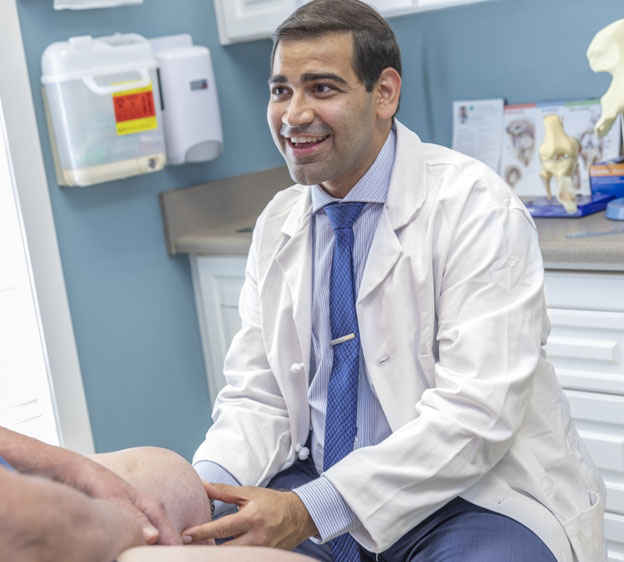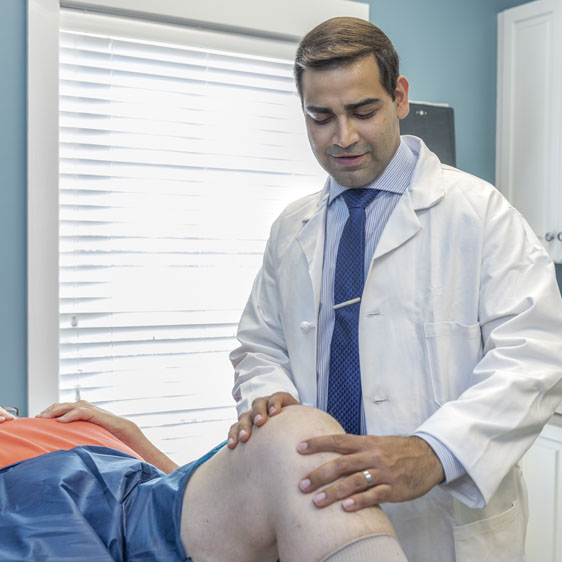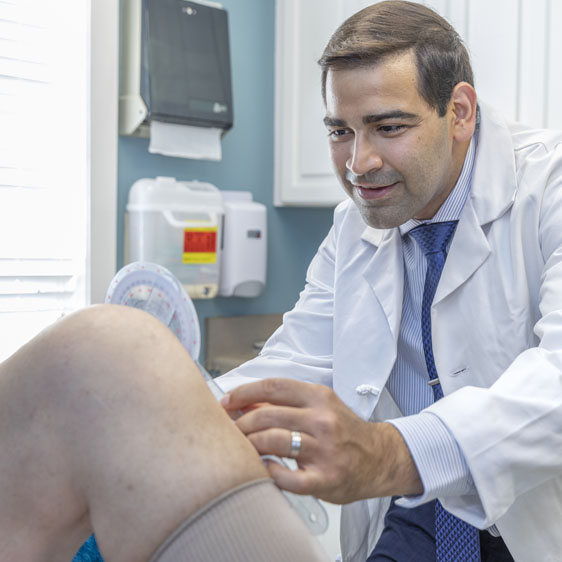
It started out with a little stiffness in your knees. Now your joints are aching and you're worried that it's only a matter of time before you'll need total knee replacement surgery.
If you're suffering from osteoarthritis - the most common cause of joint pain - it might indeed come to that. But there are plenty of treatment options that board-certified orthopedic surgeon, Dr. Vandit Sardana, recommends exploring before you opt for surgery.
 “The first step is to diagnose the cause of the pain,” says Dr. Sardana. “X-rays will show if it's osteoarthritis, a degenerative joint disease that causes the cartilage cushioning the bones of the knee to deteriorate with use and age. As it progresses, you could be left with bone rubbing on bone.”
“The first step is to diagnose the cause of the pain,” says Dr. Sardana. “X-rays will show if it's osteoarthritis, a degenerative joint disease that causes the cartilage cushioning the bones of the knee to deteriorate with use and age. As it progresses, you could be left with bone rubbing on bone.”
While the underlying process cannot be reversed, symptoms can often be effectively managed with physical therapy, medications and lifestyle changes. The multi-prong treatment can include:
- Physical therapy. Strengthening the muscles around the joint can help decrease stress to the knee and improve your flexibility and range of motion. After six to eight weeks of physical therapy, you should feel better.
- Medications. Acetaminophen (Tylenol) and nonsteroidal anti-inflammatory drugs (Advil, Motrin) can relieve osteoarthritis pain. Topical compound creams, containing anesthetic and anti-inflammatory medication, also can be effective in relieving pain.
- Cortisone injections. Corticosteroid medications can reduce inflammation - the body's response to the breakdown of cartilage in the knee joint.
- Hyaluronic acid injections. A high viscosity fluid, hyaluronic acid provides nutrients to the cartilage and greases the joint, improving the function of the knee. Typically, you would receive three to five injections over a period of weeks.
Dr. Sardana also recommends exercising regularly and maintaining a healthy weight. Carrying extra pounds puts additional strain on your knee joints and can accelerate the deterioration of joint cartilage.
 The prescribed therapy can be repeated if the pain returns. Ideally, it can prolong the deterioration of the knee for a year or two.
The prescribed therapy can be repeated if the pain returns. Ideally, it can prolong the deterioration of the knee for a year or two.
Researchers are currently studying several other remedies, including a preparation called "platelet-rich plasma." In this form of treatment, platelet-rich plasma is removed from your own blood and, through a process called centrifugation, the concentration of platelets is increased.
The platelet-rich plasma is then injected into the joint, releasing growth factors that can potentially speed up the healing process.
Stem cell therapy is another approach that has received much attention. Signaling cells taken from fat in the abdominal area are reintroduced into the damaged joint to activate other neighboring cells to regenerate cartilage.
Though these treatments are available, Dr. Sardana notes that evidence of their effectiveness has been mixed.
“When the pain in your knee is restricting your normal activities, it might be time to consider knee replacement surgery,” says Dr. Sardana. “With recent advancements in total joint replacements, new knees should last at least 15 years.”
To schedule an appointment with Dr. Sardana in Beaufort or Bluffton, call 843-524-3015.
Learn more about in-home exercises, medical management, physical therapy and surgery to relieve joint pain at the next Solving Hip and Knee Pain class with Beaufort Memorial Orthopedic Care Coordinator, Andea Sadler.
This article first appeared in the December 4, 2018, Bluffton Sun.

